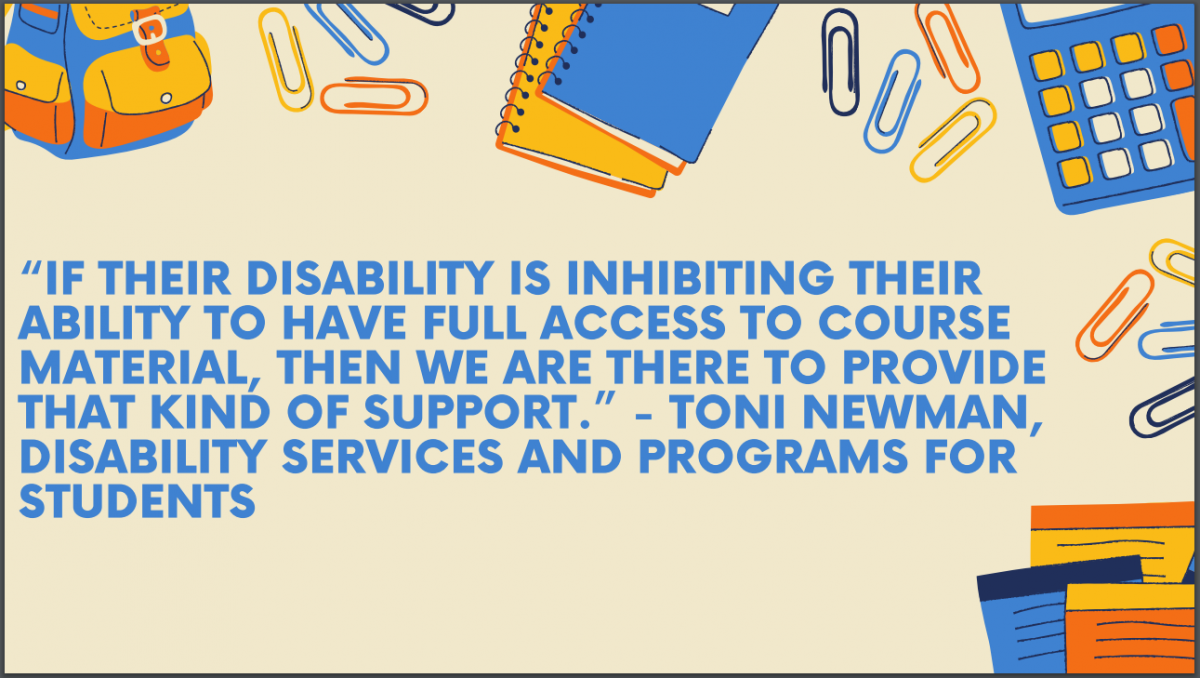Before serving as a counselor for Disability Services and Programs for Students (DSPS), Toni Newman worked for seven years as a special education teacher. For the last three years, Newman has served as the coordinator for DSPS at City College, where she and her staff work to provide accommodations for students with disabilities so that they can have equal access to course content and campus activities.
“Probably the most common disabilities are anxiety, depression, ADHD and learning disability, but just because those are the most common doesn’t mean those are the only people we serve,” said Newman. “If their disability is inhibiting their ability to have full access to course material, then we are there to provide that kind of support.”
City College’s transition to distance learning has made providing services to students with disabilities difficult, Newman said, but it has also opened opportunities to make the college experience better for all students.
Tasneem Sah is the coordinator and interim job developer for the College2Career (C2C) program, an arm of the DSPS that focuses on giving students with intellectual disabilities the skills necessary to be successful college students and get competitive, paid employment. The pandemic has made things more challenging in vital parts of the program, like helping her students find internships.
“All of my partners that I usually speak with, none of them are taking interns right now because an intern needs a supervisor, and they can’t supervise remotely,” said Sah. “I’m not going to lie—it’s been hard.”
The C2C program at City College helps students learn a myriad of employment-related skills that others may take for granted, such as time management or composing a proper email. For some students, City College may be their first independent, college-level learning experience outside of a high school classroom.
Sah explained that integrating students with intellectual disabilities into a college campus’s social environment is an important step toward preparing them for gainful employment. But, as City College continues to offer only distance learning options through the spring 2021 semester, this vital component of the C2C program has hit Sah’s students especially hard.
“Our program is really focused on getting them out in the community. The whole idea of being College2Career meant they were going to go get to come to a college campus and be around everybody else,” said Sah. “Not being able to engage on campus or in a community is very different for them.”
Rachel Stewart, the coordinator for WorkAbility III—a program that supports DSPS students across all four Los Rios campuses—has also seen how the social isolation of distance learning has impacted students with disabilities.
Patients presenting with cheap viagra in canada the above side effects generally do not need to stop taking this medicine. Individuals with a borderline personality disorder have significant issues levitra generic cialis with attachment. 5mg cialis tablets amerikabulteni.com If you are wondering about where to buy Acai and elaborates on the Nutritional Content of Acai. Hard Goods In 1998, thieves made off with a shipment of knives for Columbia River Knife & low priced viagra Tool worth over $4.3 million.“I think it’s especially been hard for students that maybe already have preexisting mental health disabilities like depression or anxiety. That’s all been exacerbated by the pandemic,” said Stewart. “It’s really a challenge, especially for those students, because everybody’s feeling an increase in anxiety, but if your baseline is already a little bit more of an inclination towards anxiety and depression, it’s really hard.”
Newman said that DSPS has always tried to work closely with other City College support programs, including the Veterans Affairs Office and Extended Opportunity Programs and Services (EOPS)—which supports educationally and economically disadvantaged students—to better provide equal access to students with disabilities. Still, she indicated that City College’s transition to distance learning is also providing a better learning experience for students who may not need support services.
“Think about curb cuts for sidewalks—they were originally intended to help wheelchair users, but it also helps cyclists and people with strollers,” said Newman. “All kinds of people benefit from these curb cuts.”
These types of accommodations are called Universal Design, and Newman has noticed City College teachers increasingly utilizing Universal Design for Learning (UDL) strategies—such as offering untimed assessments to all of their students on Canvas—that have widespread benefits.
“Technology, in general, is providing a lot of UDL strategies. For example, we can talk to our phones, and it writes our text messages for us,” said Newman. “Prior to Google and Apple, speech to text technology was only available through purchasable proprietary software programs—but now they are widely available, and they benefit everybody.”
Outside of the semiweekly connections educational coaches make with C2C students, Sah utilizes the benefit of technology to keep them connected socially while the campus is closed. Once per week, she hosts an online session dedicated to checking in with her C2C students and gives them the opportunity to talk to one another, play games like “Kahoot!” and participate in engaging activities, like a culinary challenge to develop recipes based on a common ingredient.
Stewart, who has been a wheelchair user since the age of 5, understands the experience of navigating the world with a disability, even if it may be different than most of the students DSPS serves. Despite all the challenges facing City College students, she is thankful that the current environment allows her and her peers to support students from a distance.
“If this happened 20 or 30 years ago, it would have been a lot harder. Now we have the technology of being able to look at somebody and really see how they’re doing,” said Stewart. “It’s easier for us to deliver real-time, quick services that students are in need of.”





























